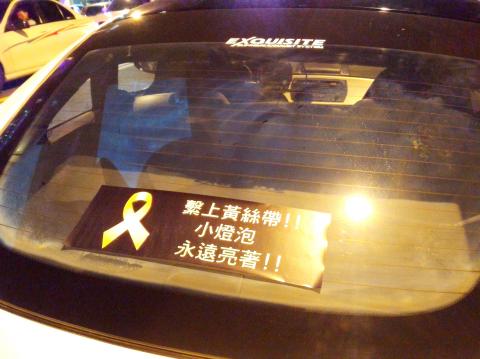A large majority of the public favors harsher sentences for people convicted of killing children under the age of 12, according to a poll, which showed strong support for the death penalty following the decapitation of a four-year-old girl on Monday.
A survey conducted by Television Broadcasts Satellite’s (TVBS) poll center found that 81 percent of respondents supported mandatory death or life in prison sentences for murder of a child under 12 years old.
Lawmakers have proposed making the sentences mandatory following the decapitation of the girl, surnamed Liu (劉), nicknamed “Little Lightbulb” (小燈泡), in Taipei’s Neihu District (內湖).

Photo: Chen Yi-kuan, Taipei Times
Broad support for the proposed changes cut across party lines and age groups, with 64 percent of those surveyed “extremely supportive.”
The TVBS poll found that 84 percent of respondents supported maintaining the death penalty, up 2 percentage points from a similar survey conducted in June last year. Support for abolishing the death penalty fell 3 percentage points from the previous poll.
When asked whether life in prison without parole could serve as an alternative to the death penalty, only 27 percent agreed, the poll showed.

Photo: Chen Yi-kuan, Taipei Times
There was a slight decline in the percentage of those who said that the death penalty acts as a deterrent for crime, with 79 percent agreeing compared with 85 percent last year.
The cable network operator’s telephone poll was conducted on Wednesday and Thursday, with 847 valid samples and a margin of error of 3.4 percentage points.
In related news, the girl’s mother — identified as Claire Wang — said on Facebook yesterday that while she “does not support” the death penalty, she also “does not agree” with its abolition.
“Often many thoughts and ideas are like religion and politics — rooted in the heart. Those who believe will always believe and those who do not never will — I only believe in what I’ve always believed in,” she said. “I still believe that love is the heart’s first intention, that society is beautiful and that human nature at its root is good.”
She asked that people who read her Facebook comments to “forgive” her for failing to respond or clarify every comment, adding that she was not “mighty” or “extraordinary” and lacked strength, caring only that her family and friends understood her.

MAKING WAVES: China’s maritime militia could become a nontraditional threat in war, clogging up shipping lanes to prevent US or Japanese intervention, a report said About 1,900 Chinese ships flying flags of convenience and fishing vessels that participated in China’s military exercises around Taiwan last month and in January last year have been listed for monitoring, Coast Guard Administration (CGA) Deputy Director-General Hsieh Ching-chin (謝慶欽) said yesterday. Following amendments to the Commercial Port Act (商港法) and the Law of Ships (船舶法) last month, the CGA can designate possible berthing areas or deny ports of call for vessels suspected of loitering around areas where undersea cables can be accessed, Oceans Affairs Council Minister Kuan Bi-ling (管碧玲) said. The list of suspected ships, originally 300, had risen to about

DAREDEVIL: Honnold said it had always been a dream of his to climb Taipei 101, while a Netflix producer said the skyscraper was ‘a real icon of this country’ US climber Alex Honnold yesterday took on Taiwan’s tallest building, becoming the first person to scale Taipei 101 without a rope, harness or safety net. Hundreds of spectators gathered at the base of the 101-story skyscraper to watch Honnold, 40, embark on his daredevil feat, which was also broadcast live on Netflix. Dressed in a red T-shirt and yellow custom-made climbing shoes, Honnold swiftly moved up the southeast face of the glass and steel building. At one point, he stepped onto a platform midway up to wave down at fans and onlookers who were taking photos. People watching from inside

Japan’s strategic alliance with the US would collapse if Tokyo were to turn away from a conflict in Taiwan, Japanese Prime Minister Sanae Takaichi said yesterday, but distanced herself from previous comments that suggested a possible military response in such an event. Takaichi expressed her latest views on a nationally broadcast TV program late on Monday, where an opposition party leader criticized her for igniting tensions with China with the earlier remarks. Ties between Japan and China have sunk to the worst level in years after Takaichi said in November that a hypothetical Chinese attack on Taiwan could bring about a Japanese

STREAMLINED: The dedicated funding would allow the US to transfer equipment to Taiwan when needed and order upgraded replacements for stockpiles, a source said The US House of Representatives on Thursday passed a defense appropriations bill totaling US$838.7 billion, of which US$1 billion is to be allocated to reinforcing security cooperation with Taiwan and US$150 million to replace defense articles provided to the nation. These are part of the Consolidated Appropriation Act, which the US House yesterday passed with 341 votes in favor and 88 against. The act must be passed by the US Senate before Friday next week to avoid another government shutdown. The US House Committee on Appropriations on Monday unveiled the act, saying that it allocates US$1 billion for the Taiwan Security Cooperation Initiative